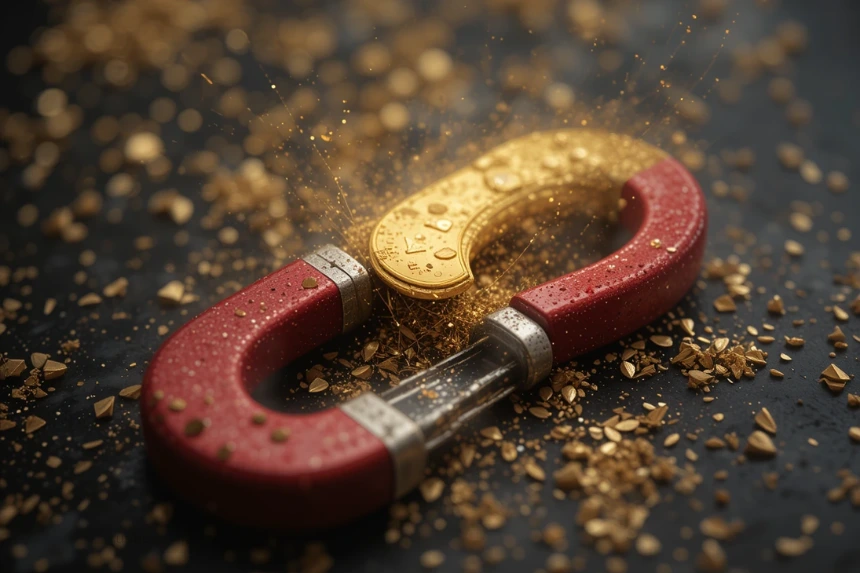Because of its value, rarity, and luster, gold has enthralled people for centuries. It’s a symbol of wealth, used in jewelry, electronics, and even in medicine. However, when it comes to the question: “Do gold stick to magnets?” The magnetic characteristics of gold and its interactions with magnetic fields pique the interest of many people.Due to its diamagnetic nature, pure gold will not be drawn to the magnet. This article aims to explore this query comprehensively, providing insights into the nature of gold and its relationship with magnets.
Understanding Gold’s Physical and Chemical Properties
Before delving into the specifics of whether gold sticks to magnets, it’s essential to understand the fundamental properties of gold itself. Gold (Au) is a transition metal belonging to the group of noble metals, renowned for its resistance to corrosion and oxidation. Its unique physical traits include high ductility, excellent electrical conductivity, and a distinctive bright yellow color.
One key aspect that influences whether gold can stick to a magnet is its magnetic property, which depends on its atomic structure and electron configuration. Typically, materials are classified into three categories based on their magnetic behavior: ferromagnetic, paramagnetic, and diamagnetic. The question at hand relates to whether gold displays any of these magnetic properties capable of causing it to adhere to a magnet.
Magnetic Properties of Gold: Does It Stick to Magnets?
Gold is generally classified as a diamagnetic material. A type of magnetism known as diamagnetism produces a very weak repulsion when a material generates a magnetic field in opposition to an externally supplied magnetic field.Because of this weak response, diamagnetic materials do not stick to magnets.
Why Does Gold Not Stick to Magnets?
Since gold is diamagnetic, it is intrinsically non-magnetic. When exposed to a magnetic field, gold does not exhibit attraction like ferromagnetic materials such as iron, cobalt, or nickel. Instead, it slightly repels the magnetic field, but this effect is so weak that it’s practically undetectable without highly sensitive instruments.
In everyday scenarios, this means that a typical household magnet will not attract or hold gold objects. Whether it’s a gold ring, gold jewelry, or gold coins, they will not be magnetically attracted or stick to magnetic surfaces under normal conditions.
Common Misconceptions About Gold and Magnetism
There are some misconceptions related to gold and magnetism, often stemming from the fact that many metallic objects can be confused when testing magnetic properties. For example, jewelry that appears to be gold might actually be gold-plated or mixed with other metals that are magnetic.
Gold-Plated or Gold-Filled Jewelry
Many jewelry items are either gold-plated or gold-filled, with a thin layer of gold attached to a base metal like steel or iron. The jewelry may adhere to a magnet since these basic metals have the ability to be magnetic.However, the gold layer itself remains non-magnetic.
Authentic Gold and Magnetic Tests
A simple test can help determine if a piece of jewelry is genuine gold: if it sticks to a magnet, it’s likely not pure gold or may contain magnetic metals. Due to its diamagnetic nature, pure gold will not be drawn to the magnet.It’s always advisable to confirm authenticity with professional testing or using chemical assays.
Magnetic Gold Alloys and Composites
While pure gold does not stick to magnets, it’s important to note that some gold alloys and composites can be magnetic if combined with ferromagnetic metals. For instance, gold alloys with high concentrations of cobalt, nickel, or iron may behave magnetically.
Gold-Nickel Alloys
Certain gold alloys incorporate nickel, which is ferromagnetic, and these can be attracted by magnets. Such alloys are sometimes used in jewelry for durability or aesthetic reasons. Therefore, a piece of gold alloy containing nickel might stick to a magnet, but this is due to the alloy, not pure gold itself.
Practical Implications of Gold’s Non-Magnetic Nature
Understanding that gold does not stick to magnets has practical implications across various industries. In jewelry, this property helps confirm the purity of gold items. In electronics, gold’s non-magnetic qualities mean it does not interfere with magnetic fields, making it ideal for connectors and circuitry where magnetic interference could be problematic.
Furthermore, in scientific research, knowing the magnetic properties of materials like gold is essential for precise applications such as magnetic resonance imaging (MRI) and other technologies.
Conclusion: The Final Verdict on “Do Gold Stick to Magnets?”
This answer answers the question, “Does gold stick to magnets?” is clear from all the scientific data: Pure gold is diamagnetic, hence it does not stick to magnets. Instead, it exhibits a very weak repulsive response when subjected to magnetic fields, which is typically undetectable without specialized equipment.
Misconceptions could arise, though, if other magnetic metals are included in gold alloys or jewelry because they can attract. Always verify the composition when testing items for magnetic properties, especially if authenticity is a concern.
In summary, gold’s non-magnetic characteristic is one of its many fascinating features, highlighting its stability and inertness — qualities that have contributed to its enduring value through the ages.



